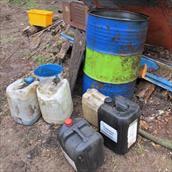Background

Picture by Niina Viitala.
In the investigation of environmental crimes, environmental authorities, the police and prosecutors are key actors. In the case of suspected environmental offence of chemicals, the police and the prosecutor must ascertain whether the investigation threshold for the crime is exceeded or should the investigation be waived. Parties involved in the crime process are not always familiar with all the concepts related to chemicals, which complicates formation and interpretation of expert opinions. In addition, a common terminology between different authorities related to chemical information is missing. Additional problems include the incoherence of chemical data and the identification of its reliability as well as the absence of an established procedure for identification of potential hazards.
This project was executed as a Master thesis for the Aalto University (abstract available in English).
Aim
The aim of the project was to find tools to promote the use and interpretation of good quality chemical data in environmental crime processes. Current procedures in finding relevant chemical data as well as in determination of possible potential hazards was studied by a questionnaire and by interviews. Also the municipal and state environmental officials’ need for expert support was explored.
Results
All parties involved in the environmental crime process have lacks in knowledge concerning evaluation of possible hazards of chemicals to the environment. Especially municipal environmental officials lack resources and required expertise. Officials need better skills on criminal legislation and call for joint terminology.
Information of the environmental hazards provided by chemicals and other hazardous compounds are scattered and the responsibilities of environmental aspects of chemical issues between expert institutes in Finland chemical is not known to all parties.
Information of chemicals should be more easily available (e.g. on www-pages) and instructions on how to identify reliable sources of information are needed.
Instructions for different phases in the environmental crime process, especially for authoring expert opinions are needed.
Recommendations
Municipal and state environmental officials should have the skills to provide all information on the environmental effects of chemicals needed during the whole environmental crime process to the police, prosecutor and judge. Environmental officials should also actively make sure that all information needed is provided to the police, prosecutor and judge.
Addition of references to expert opinions would increase the reliability of chemical data provided in them.
One way to secure sufficient environmental knowledge and save resources is to centralize the process to specified groups of investigation authorities.
Follow-up of the results
The following needs were identified from the results:
- Development of further education on environmental hazards of chemical and other harmful substances for officials involved in environmental crime processes.
- Dissemination of information regarding the reliability of information sources available on the Internet.
- In collaboration with Aalto University a governance analysis on chemical responsibilities on Finland will be done.
In addition, ymparisto.fi -web-pages will be updated and extended.
Additional information
Project coordinator Katarina Björklöf, Finnish Environment Institute (SYKE) p.0295 251 086
Email: firstname.lastname@ymparisto.fi
Twitter: @bjorklof
LinkedIn: Katarina Björklöf (Lotta)